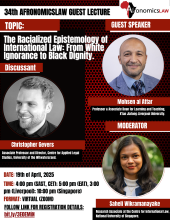While each post focuses on distinct contexts and frameworks, several overarching themes emerge. First, the posts reveal divergent conceptualizations and applications of the concepts of double standards in international legal practice, which in turn raises further questions about how best to examine the role of double standards in fields as disparate as international economic and criminal law. Second, the posts underscore the tension between the ideals of universality and the realities of power in international law: whether in the Human Rights Council, international criminal tribunals, or through state practice, double standards reveal the gap between abstract normative aspirations and political constraints that undermine consistent and principled action in specific cases. Third, the posts begin to identify the rhetorical and practical tools used to navigate or exploit this tension. From Esponda’s exploration of argumentative strategies to Schüller’s critique of procedural openings, the posts show how states and institutions justify selective actions while striving to maintain legitimacy. Fourth, some posts broach the question to what extent double standards are a remediable aspect of practice or, alternatively, an unavoidable feature of the international legal system.
